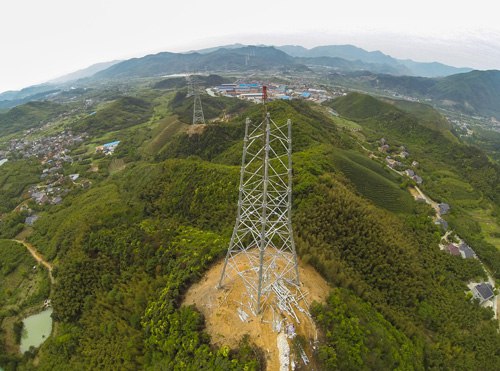|
 |
|
POWER GRID: The North Zhejiang-Fuzhou ultra-high voltage project starts in Yuhang District, Hangzhou, capital of east China's Zhejiang Province . The project has a total length of 603 km (XU YU) |
FTZ Rules Submitted
Much-anticipated operational rules for the China (Shanghai) Pilot Free Trade Zone (FTZ), awaiting approval by local legislators, are expected to come into force in the second half of 2014 and lay a legal foundation for further reform. Under the draft, the rules will take effect on August 1.
Jiang Sixian, Vice Chairman of the Standing Committee of Shanghai Municipal People's Congress, told a forum in April that the new rules will be passed by the end of June. As a comprehensive framework, they will cover issues such as investment, trade, finance, tax and the legal environment. They also will legalize reforms already in place, such as removal of the foreign currency deposit rate and permission for offshore accounts in the FTZ.
Innovations adopted by the FTZ such as a "negative list" management approach for foreign investment, designed to bring about more transparency and freedom, also will be incorporated.
Tax Reduction
Chinese small businesses eligible for a tax break may enjoy the policy directly without an approval, according to China's taxation authority.
The State Administration of Taxation (SAT) said in a statement on April 24 that small firms with annual taxable income under 100,000 yuan ($16,030) may have their business income tax halved without approvals.
In early April, China rolled out the tax break, which is valid from January 1 this year until the end of 2016, shortly after a State Council executive meeting, at which the government announced an economic package to address downward pressure.
"Eligible firms are only required to put their financial conditions on record at local taxation authorities, even though the firms have no complete accounting books," said the SAT statement. Those that had paid business income tax fully before April 8 can get refunds, according to the statement.
Small and micro firms serve as the foundation for continuous and steady economic growth, according to SAT. By the end of 2013, there were about 11.7 million small and micro companies in China, accounting for 76.6 percent of the total number of firms in the country.
Urbanization Up
China will enhance reforms in the management of population data, land, funding guarantees, housing and environmental protection to boost the urbanization process.
Xu Shaoshi, Minister of the National Development and Reform Commission (NDRC), said on April 19 that the rapid urbanization process in China has created problems, such as a huge population transfer from rural to urban areas and low efficiency in urban land use.
The work in population management will accelerate household registration system reform, improve basic public services and build a nationwide population database, Xu said.
The standard of urban land use and planning will be strictly complied with, while the NDRC will explore incentives for increasing and redeveloping urban construction land.
Fiscal and tax reforms will balance government financial resources with public service duties and attract more social capital for city construction through a transparent investment and financing mechanism and healthy bond issuance system, Xu said.
More affordable housing will be provided for basic housing requirements, while the market will play a bigger role in satisfying different consumption needs, according to the NDRC.
Meanwhile, the NDRC will continue to improve ecological urban design and industrial structure with stricter regulations on environmental protection in order to upgrade green development. | 